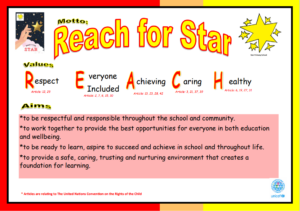Provision of Time for Reflection (Religious Observance) at
Star Primary School
What is Time for Reflection (otherwise known as Religious Observance)?
Religious Observance (RO) is defined for schools in Scotland as: “Community acts which aim to promote the spiritual development of all members of the school community and express and celebrate the shared values of the school community.” (Religious Observance Review Group Report 2004)
In line with current policy and legislation all Fife Schools are expected to fulfil this statutory requirement through undertaking acts of Religious Observance (RO) as described below. In this guidance, RO is referred to as Time for Reflection (TfR), although other names may be used to describe it.
Time for Reflection in Star Primary School
Star Primary places high importance on ensuring that TfR is inclusive of a diverse range of faith and belief traditions and reflects both faith and non-faith perspectives. We are proactive in ensuring high-quality, pupil, staff, and partner-led opportunities and events that enable a shared community understanding and celebration of the diversity within TfR.
We offer a vigorous RME progression and welcome the opportunity to work with a range of partners who represent faith and non-faith groups which reflect and are relatable to the diverse beliefs and values of our school community.
Our Vision, Values and Aims Star Primary School:

TfR links to our school vision and values in the following ways:
- Inclusivity and Respect for Diversity: Our school is inclusive of the diverse faiths and belief traditions, reflecting our commitment to respecting all students’ backgrounds. TfR aims to bring together all members of the school community, no matter their religious or non-religious perspective, promoting a shared sense of community.
- Spiritual and Personal Development: The TfR programme’s primary goal is to foster the spiritual development of all school members. This aligns with our vision of providing the best opportunities in both education and wellbeing.
- Celebrating Diversity:. The TfR programme directly ties into ‘respect’ by creating opportunities to acknowledge and appreciate the different cultures, faiths, and worldviews present within the school, including during assemblies and whole-school events.
- Engagement with Community: The school’s involvement in community projects and the promotion of charity are directly connected to our values around social responsibility and care for others. TfR encourages these behaviours through activities such as charity events and collaborative projects that strengthen students’ understanding of their impact as citizens.
- Building Relationships: The collaborative approach to TfR, where staff, students, and external partners come together, reflects our school’s aim of building strong relationships within the community.
Opportunities for TfR are provided for our young people in the following ways:
- Assemblies focused on our school, our values, beliefs around the world, and how we reflect these values in our interactions with our wider community, will be held throughout the school year, usually weekly.
- Involvement in community projects to support, for example, developing the value of charity.
- Focused year group, small group or whole school opportunities to develop the young person’s four capacities to be: a successful learner, confident individual, responsible citizen and effective contributor.
- Whole school events that celebrate and promote the diverse achievements, cultural heritage, and talents of young people e.g. Award ceremonies or other family engagements.
- Extracurricular groups and prayer space following the faith needs of the school community.
What part does worship play in the school TfR programme?
Our school approach to TfR aligns with the recommendations of the Religious Observance Review Group Report 2004:
“Where … there is a diversity of beliefs and practices, … the appropriate context for an organised act of worship is within the informal curriculum as part of the range of activities offered for example by religions, groups, chaplains and other religious leaders.” (Religious Observance Review Group Report 2004). This may include, for example, lunchtime or after-school activities or events.
Can I withdraw my young person from Time for Reflection/ Religious Observance?
Under the terms of the Education (Scotland) Act 1980, parents/ carers/ families do have the right to withdraw their child from Time for Reflection/ Religious Observance. Where a request is made, we will work in partnership with families to manage this with sensitivity and understanding.
If you wish to make a request please email: starps.enquires@fife.gov.uk
Following receipt of this communication, a member of the school Senior Leadership Team will arrange a meeting with you to explain in more detail our inclusive approach to RO, discuss any implications for withdrawal and to agree suitable arrangements as an alternative where required.
Where a young person wishes to undertake religious practice or worship as part of their school day, we will seek to provide facilities which support this.

